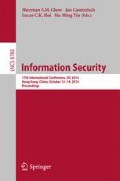Abstract
Service providers (SPs) that allow anonymous access need to protect their services against misbehaving users. Several schemes are proposed to achieve anonymous revocation without a trusted third party, thus protecting users’ privacy. They either have linear computational complexity in the size of the blacklist (EPID, BLAC, BLACR), or require all misbehaviors being identified in a time window (PEREA, PERM).
In ESORICS 2012, Yu et al propose an efficient scheme called PE(AR)2 which does not require the SPs to review sessions in a timely manner. However, we find there are security problems in PE(AR)2. We propose ARBRA, a reputation-based revocation system for which the SPs can assign positive or negative scores to anonymous sessions and block the users whose reputations are not high enough. ARBRA allows the SPs to ramp up penalties for repeated misbehaviors from the same user and does not require the SPs to judge misbehaviors within a time window. Our benchmark shows that ARBRA has the best performance on the SP side among existing schemes and is also efficient on the user side even if the misbehavior list contains one million entries.
Access this chapter
Tax calculation will be finalised at checkout
Purchases are for personal use only
Preview
Unable to display preview. Download preview PDF.
References
Boneh, D., Boyen, X., Shacham, H.: Short group signatures. In: Franklin, M. (ed.) CRYPTO 2004. LNCS, vol. 3152, pp. 41–55. Springer, Heidelberg (2004)
Boneh, D., Shacham, H.: Group signatures with verifier-local revocation. In: Proceedings of ACM CCS 2004, pp. 168–177. ACM (2004)
Camenisch, J., Lysyanskaya, A.: Dynamic accumulators and application to efficient revocation of anonymous credentials. In: Yung, M. (ed.) CRYPTO 2002. LNCS, vol. 2442, pp. 61–76. Springer, Heidelberg (2002)
Li, J., Li, N., Xue, R.: Universal accumulators with efficient nonmembership proofs. In: Katz, J., Yung, M. (eds.) ACNS 2007. LNCS, vol. 4521, pp. 253–269. Springer, Heidelberg (2007)
Nguyen, L.: Accumulators from bilinear pairings and applications. In: Menezes, A. (ed.) CT-RSA 2005. LNCS, vol. 3376, pp. 275–292. Springer, Heidelberg (2005)
Tsang, P.P., Kapadia, A., Cornelius, C., Smith, S.W.: Nymble: Blocking misbehaving users in anonymizing networks. IEEE Transactions on Dependable and Secure Computing 8(2), 256–269 (2011)
Henry, R., Henry, K., Goldberg, I.: Making a nymbler nymble using VERBS. In: Atallah, M.J., Hopper, N.J. (eds.) PETS 2010. LNCS, vol. 6205, pp. 111–129. Springer, Heidelberg (2010)
Tsang, P.P., Au, M.H., Kapadia, A., Smith, S.W.: Blac: Revoking repeatedly misbehaving anonymous users without relying on ttps. ACM Transactions on Information and System Security (TISSEC) 13(4), 39 (2010)
Brickell, E., Li, J.: Enhanced privacy id: A direct anonymous attestation scheme with enhanced revocation capabilities. In: Proceedings of WPES 2007, pp. 21–30. ACM (2007)
Au, M.H., Tsang, P.P., Kapadia, A.: Perea: Practical ttp-free revocation of repeatedly misbehaving anonymous users. ACM Transactions on Information and System Security (TISSEC) 14(4), 29 (2011)
Lofgren, P., Hopper, N.: Faust: efficient, ttp-free abuse prevention by anonymous whitelisting. In: Proceedings of WPES 2011, pp. 125–130. ACM (2011)
Au, M.H., Kapadia, A., Susilo, W.: Blacr: Ttp-free blacklistable anonymous credentials with reputation. In: Proceedings of NDSS 2012, San Diego, CA, USA (2012)
Au, M.H., Kapadia, A.: Perm: Practical reputation-based blacklisting without ttps. In: Proceedings of ACM CCS 2012, pp. 929–940. ACM (2012)
Yu, K.Y., Yuen, T.H., Chow, S.S.M., Yiu, S.M., Hui, L.C.K.: PE(AR)2: Privacy-enhanced anonymous authentication with reputation and revocation. In: Foresti, S., Yung, M., Martinelli, F. (eds.) ESORICS 2012. LNCS, vol. 7459, pp. 679–696. Springer, Heidelberg (2012)
Henry, R., Goldberg, I.: Thinking inside the blac box: Smarter protocols for faster anonymous blacklisting. In: Proceedings of WPES 2013, pp. 71–82. ACM (2013)
Dusart, P.: The k th prime is greater than k (ln k+ ln ln k-1) for k 2. Mathematics of Computation, 411–415 (1999)
Damgard, I.: On σ-protocols. Lecture notes for CPT (2002)
Camenisch, J., Stadler, M.: Efficient group signature schemes for large groups. In: Kaliski Jr., B.S. (ed.) CRYPTO 1997. LNCS, vol. 1294, pp. 410–424. Springer, Heidelberg (1997)
Fujisaki, E., Okamoto, T.: Statistical zero knowledge protocols to prove modular polynomial relations. In: Kaliski Jr., B.S. (ed.) CRYPTO 1997. LNCS, vol. 1294, pp. 16–30. Springer, Heidelberg (1997)
Damgård, I.B., Fujisaki, E.: A statistically-hiding integer commitment scheme based on groups with hidden order. In: Zheng, Y. (ed.) ASIACRYPT 2002. LNCS, vol. 2501, pp. 125–142. Springer, Heidelberg (2002)
Camenisch, J., Lysyanskaya, A.: A signature scheme with efficient protocols. In: Cimato, S., Galdi, C., Persiano, G. (eds.) SCN 2002. LNCS, vol. 2576, pp. 268–289. Springer, Heidelberg (2003)
Camenisch, J., Chaabouni, R., Shelat, A.: Efficient protocols for set membership and range proofs. In: Pieprzyk, J. (ed.) ASIACRYPT 2008. LNCS, vol. 5350, pp. 234–252. Springer, Heidelberg (2008)
Peng, K., Bao, F.: Vulnerability of a non-membership proof scheme. In: SECRYPT 2010, pp. 1–4. IEEE (2010)
Author information
Authors and Affiliations
Editor information
Editors and Affiliations
Rights and permissions
Copyright information
© 2014 Springer International Publishing Switzerland
About this paper
Cite this paper
Xi, L., Shao, J., Yang, K., Feng, D. (2014). ARBRA: Anonymous Reputation-Based Revocation with Efficient Authentication. In: Chow, S.S.M., Camenisch, J., Hui, L.C.K., Yiu, S.M. (eds) Information Security. ISC 2014. Lecture Notes in Computer Science, vol 8783. Springer, Cham. https://doi.org/10.1007/978-3-319-13257-0_3
Download citation
DOI: https://doi.org/10.1007/978-3-319-13257-0_3
Publisher Name: Springer, Cham
Print ISBN: 978-3-319-13256-3
Online ISBN: 978-3-319-13257-0
eBook Packages: Computer ScienceComputer Science (R0)

